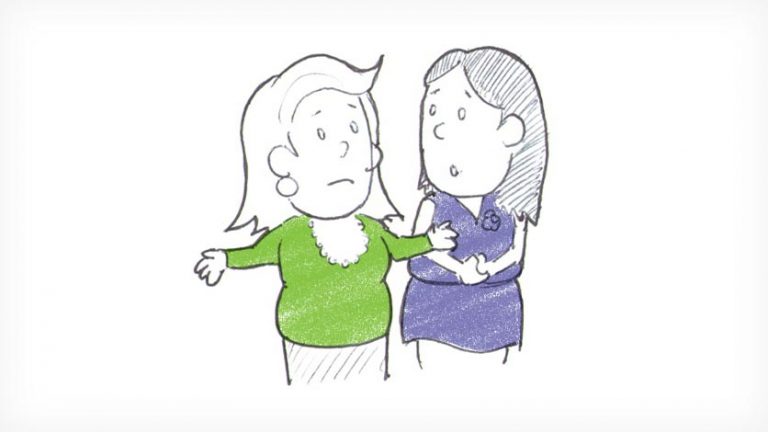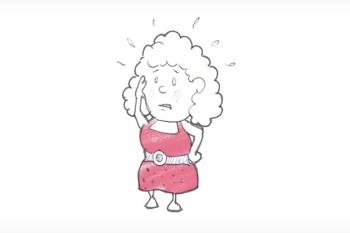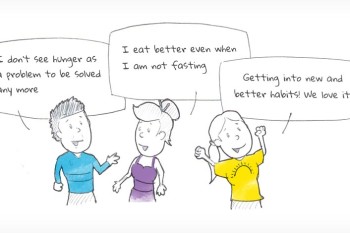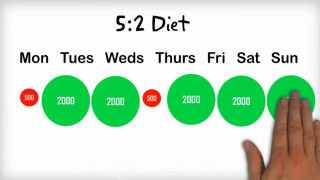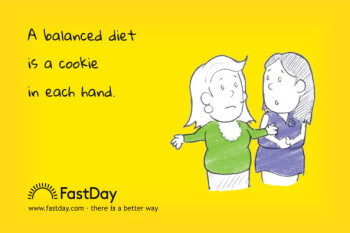Some people go through a time when they are always hungry and never satisfied even on non-fast days. If this happens to you, it is likely to be caused by one of two things:
- Stress. If you are going through a stressful time, this can cause feelings of hunger.
- The ‘famine reaction’ in which your body reacts to weight loss
Stress
Let’s start with stress: ask yourself whether you are experiencing stress. Remember also that losing weight, whether by fasting or any other means is stressful for the body.1 When we are are stressed we produce more of the hormone, cortisol, and this is one of the hormones that influences our appetites. High cortisol levels seem to prompt cravings for junk foods2 and people who tend to eat in response to emotions may be particularly sensitive to the increase in cortisol levels.3
Stress is a big issue for many of us and we have more information on this subject. Learn more about stress and fasting
Famine reaction
The so-called famine reaction was named by Dr Amanda Sainsbury-Salis, an Australian researcher who has studied how our bodies respond to dieting.4 Some people who have been losing weight for a long period of time can start to experience food cravings and intense hunger.
The famine reaction is probably driven by the hormone leptin. Leptin is made by your fat cells (adipose tissue) and it’s job is to tell the brain that you have adequate fat stores to survive a famine.5 When you lose weight, your amount of adipose tissue is reduced and so your leptin levels fall and this increases hunger.
Learn more about how our metabolism changes as we lose weight
Not everyone experiences this ‘famine reaction’ and there is considerable debate among scientists about whether the reaction is triggered by a particular amount of weight loss (e.g. 10% of your start weight lost) or after a set length of time (e.g. after 6 months of dieting) or when you reach a particular weight (your ‘set point’ – and there is debate about whether such set weights really exist too). It may even depend on how fast you lose the weight. Unfortunately, for many people the famine reaction will occur even when they still have plenty of weight to lose. In fact, the heavier your starting weight, the more likely you are to experience a famine reaction before you reach a healthy BMI. It may be that those who are very overweight have a higher ‘set point’ than those who are only mildly overweight and this accounts both for their fat gain and the triggering of the famine reaction.
Signs of a famine reaction include:
-
Constant nagging hunger and cravings for high-calorie, high-carbohydrate foods
-
Constant tiredness and lethargy
-
Feeling cold.
How can I overcome the famine reaction?
It is important to eat well on your non-fast days and ensure that you are not trying to restrict your calorie intake then as well as on your fast days. Trying to overcome the famine reaction by eating even less will actually worsen the effect and cause you to be more stressed. Simply filling your stomach with low calorie foods like salad, or by drinking water will not stop the hunger pangs for long. But eating those high-carbohydrate foods you crave will also not be helpful as it will cause a rapid rise in blood sugar which will trigger insulin release followed by a drop in blood sugar which will itself stimulate hunger.
It is best to focus on keeping carbohydrates under control but to eat more protein, fats and vegetables. Both fasting and a low carbohydrate diet encourage the body to produce ketones to supply energy, and ketones appear to suppress appetite, so when you are not fasting a low carbohydrate diet will help you to control hunger. Do not try to restrict calories below your calculated TDEE (total daily energy expenditure estimated by your FastDay progress tracker).
It is probably wise to take a short break from fasting at this time. Aim to keep hunger at bay and feel satisfied (but not over-full) for at least a week, preferably two, before reintroducing a fast day. As you re-start fasting, monitor how you react and do not introduce a second fast day until you are sure your non-fast days are under control. Continue to avoid any foods that are high in carbohydrate, especially sugary foods and drinks.
Regular exercise enough to suppress hunger but not stimulate it, may also be helpful.
Leptin naturally increases overnight and so getting a good night’s sleep can help with hunger problems.
In addition, try to address any causes of stress in your life that may have exacerbated the famine reaction.

